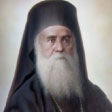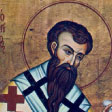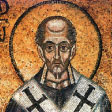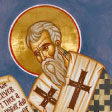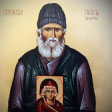Saint Gregory of Nyssa
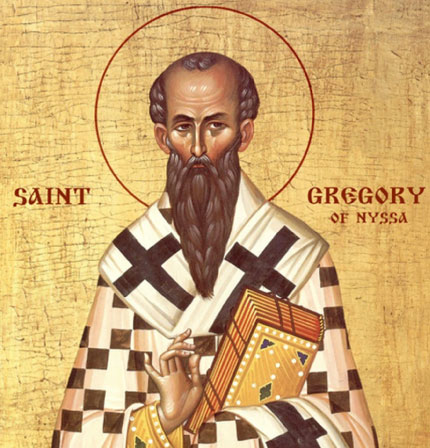
The Life and Ministry of Saint Gregory of Nyssa
Saint Gregory of Nyssa, a towering figure in the golden age of patristic theology, shines as one of the Cappadocian Fathers alongside his brother, Saint Basil the Great, and their friend, Saint Gregory of Nazianzus. His life and works reveal a profound commitment to the mystery of God, expressed not merely through doctrinal clarity but through the language of mystical ascent and divine contemplation. Gregory’s thought continues to inspire the faithful, inviting them to journey deeper into the inexhaustible beauty of God’s presence.
Early Life and Formation
Gregory was born around 335 AD in the region of Cappadocia (modern-day Turkey) into a family of remarkable piety and learning. His parents, Basil the Elder and Emmelia, were known for their devout faith, and several of his siblings, including Saint Macrina the Younger and Saint Basil the Great, are venerated as saints. The fertile spiritual environment of his family nurtured Gregory’s early development, laying the foundation for his future as a theologian and pastor.
Gregory's education was both classical and theological. Unlike his brother Basil, who studied in Athens, Gregory initially pursued a secular career in rhetoric, possibly teaching as a professional rhetorician. His rhetorical training sharpened his eloquence, a skill that would later serve him well in his theological writings and sermons. However, drawn increasingly to the contemplative life, Gregory eventually abandoned his secular ambitions and embraced the monastic ideal under the influence of his sister Macrina, whose ascetic example profoundly shaped his spiritual path.
The Call to Ministry
Gregory’s entrance into ecclesiastical life was not by personal ambition but by divine providence and the encouragement of his brother Basil. Around 372 AD, Basil, then the Archbishop of Caesarea, appointed Gregory as the bishop of Nyssa, a small and somewhat obscure diocese. Though Gregory’s temperament leaned more toward quiet study and reflection than administrative duties, he accepted this role with humility.
Gregory's time as bishop was not without tribulation. His opponents, likely supporters of the Arian heresy, sought to undermine him, leading to false accusations of mismanagement and resulting in his exile around 376 AD. This period of exile, while difficult, became a time of spiritual deepening and theological productivity. Gregory's return to his see in 378 AD, after the death of the pro-Arian Emperor Valens, marked the beginning of his ascent as a leading theological voice in the post-Nicene Church.
The Theological Vision of Gregory
Gregory of Nyssa stands out not only for his defense of Nicene orthodoxy but for the depth and beauty of his theological reflections. His works are infused with a vision of God as infinite, transcendent, and yet intimately present. Gregory’s thought often draws from the Scriptures, particularly the imagery of light, ascent, and transformation.
Central to Gregory’s theology is the concept of epektasis – the idea that the human soul is called to an endless progression toward God. He draws upon the Apostle Paul’s words, “forgetting what lies behind and straining forward to what lies ahead” (Phil. 3:13), to articulate the belief that the human encounter with God is never static but a continual deepening. For Gregory, even in eternity, the soul will forever ascend into the inexhaustible mystery of God’s love.
His treatise The Life of Moses exemplifies this mystical vision. Gregory interprets Moses’ ascent of Mount Sinai as an allegory for the soul’s journey toward divine union. The closer Moses approaches God, the more he enters into the divine darkness – a symbol of the soul’s entrance into the mystery that surpasses all human understanding.
Another cornerstone of Gregory’s theology is his robust defense of the Trinity. In his work On Not Three Gods, Gregory eloquently articulates the unity of the Godhead while preserving the distinct personhood of the Father, Son, and Holy Spirit. His articulation of divine simplicity and relational unity remains one of the most profound contributions to trinitarian thought in the early Church.
Pastoral Care and Defense of the Faith
Gregory’s theological acumen was matched by his pastoral sensitivity. His sermons often addressed practical moral concerns, calling the faithful to a life of virtue rooted in the love of God. Gregory emphasized the importance of compassion, humility, and care for the poor, recognizing that the life of the Church must reflect the kenotic love of Christ.
One of Gregory’s most significant contributions to the life of the Church came during the Second Ecumenical Council in Constantinople in 381 AD. As a leading voice at this council, Gregory helped to reaffirm and clarify the Nicene Creed, strengthening the Church’s stand against Arianism and other Christological heresies. His defense of the full divinity of the Holy Spirit was instrumental in shaping the final form of the Creed, securing the Church’s trinitarian doctrine for generations to come.
The Legacy of Gregory’s Writings
Saint Gregory’s literary corpus is vast and diverse, encompassing dogmatic treatises, scriptural exegesis, homilies, and letters. His Great Catechism serves as a comprehensive guide to Christian doctrine, addressing the nature of salvation, the sacraments, and the incarnation of Christ. In this work, Gregory emphasizes the transformative power of the Eucharist, describing it as a mystical participation in the divine life.
His Against Eunomius series remains a vital text in the Church’s defense against Arian subordinationism, underscoring the equality and unity of the Trinity. Gregory's writings on the resurrection and the soul’s immortality, found in On the Soul and the Resurrection, reflect his deep conviction in the ultimate triumph of God’s love and the restoration of all things in Christ.
The Death and Canonization of Gregory
Gregory of Nyssa likely reposed in the Lord around 395 AD. Though his passing marked the end of his earthly journey, his influence within the Church only grew. Recognized as one of the great Doctors of the Church, Gregory’s works continue to illuminate the path of those seeking to know God more deeply.
The Orthodox Church commemorates Saint Gregory of Nyssa on January 10, celebrating his unwavering defense of the faith and his mystical insights into the divine life. His writings are treasured not merely as theological artifacts but as living springs from which the faithful may drink, drawing nourishment for the journey of the soul toward God.
A Saint for All Seasons
Saint Gregory of Nyssa’s life and ministry offer an enduring witness to the transformative power of divine love and the inexhaustible mystery of God. In an age often marked by spiritual complacency, Gregory’s vision calls the faithful to continual growth, urging them to ascend ever higher toward the light of Christ. His voice, echoing through the centuries, reminds us that the pursuit of God is an eternal pilgrimage – a journey from glory to glory, until at last we behold the face of our Creator in the radiant light of the age to come.

